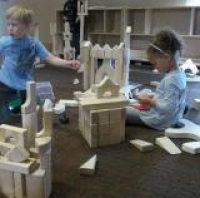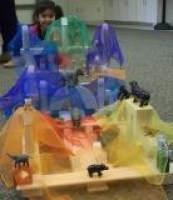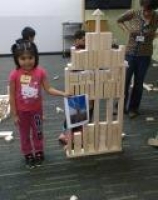Proj. BLOCKS - Blocks Let Our Children Know Science
Pierce County Library System, Wash.
Innovation Synopsis
The addition of blocks in libraries supports language acquisition and beginning STEM development among preschool children. Block play is research-based. It supports development of language in young children as they play with adults and peers. It promotes social emotional development and development of early math and science concepts.
Challenge/Opportunity
20 years of research demonstrates that children engage in math and science exploration from a very young age. Early experiences play a significant role in the development of informal math and science concepts and serve as a foundation for later cognitive development. Between birth and five years of age, children develop STEM concepts such as identifying shapes and patterns, counting, balancing and spatial relations. They are also exposed to operations such as addition and subtraction. This is all done through play, a child’s natural learning lab. Play provides the basis for formal math and science learning later in life. Block play, in particular, offers a rich opportunity for children to experiment with STEM concepts. Research shows that preschool block play is related to several indicators of math interest and skill. Research also shows that block play may enhance language acquisition in young children and develop social emotional skills. Low-income children are the least likely to either have blocks in the home or engage in open-ended block play in a group setting. Project B.L.O.C.K.S. offers every child in the community the chance to play with blocks. By providing blocks at the Library for open programs, and also working with Head Start classes in our community all children are offered a monthly library block program where they hear stories, engage with peers, and build whatever they chose.
Key Elements of Innovation
Block sets and cabinets were purchased for seven pilot libraries, and the project launched in January 2013 for six months.
Youth Services librarians and staff from designated ECEAP (Washington’s Head Start) child care classes were trained on block play: research, developmental stages, how to help scaffold play, and how to observe children while playing using WaKids (Washington State mandated assessment tool for preschoolers measuring progressions of development and learning).
- Transportation for classes was provided upon request to address an identified participation barrier.
- 8 classes visited the Library monthly and 125 children engaged in open-ended block play.
- Librarians provided storytime at each visit using books relating to building with blocks.
- Librarians connected books with activities such as creating specific structures, or recreating an activity. For example: building a pretend bed then acting out 10 Little Monkeys Jumping on the Bed. Children built whatever they chose anywhere in the meeting room. There were two rules.
- No throwing blocks
- No destruction of anyone else’s structure.
- Drawings were made and photos taken of children’s structures. These were shared at each session.
- With language development as a goal, children were encouraged to talk about their structures with classroom teachers, other children, and librarians. Parents were encouraged to attend with their child and engage in the activities.
- To reinforce block play, each child was given a set of small blocks for home use along with handouts about block play and activity suggestions for the parents.
Children were assessed in October 2012, and in June 2013. Pre-identified WaKids results for each class were used to measure the outcomes. The program has continued and expanded since the pilot.
Achieved Outcomes
- Give every child the opportunity to participate in block play. 125 children participated in monthly block play events. Each child received a set of blocks to keep.
- Increase children’s language, and STEM skills. Based on the results reported in WaKIDS, each classroom demonstrated an increase in language and math related skills. Block play contributed to this increase.
- Enrich the Library’s early learning initiatives to the community. Block play is now available at every library, providing an additional free early learning tool for families and classes to utilize. Since the pilot, 250 additional children in 13 ECEAP classes have participated in the program.
- Provide feedback to ECEAP to improve block play’s recognition as a strong and viable early learning method. The ECEAP teachers debrief demonstrated that the block project enriched the children’s engagement with blocks in the classroom.
- Improve preparation to succeed at school. 80% of all children within participating ECEAPs will be at or above level as measured in WaKIDS assessment areas appropriate to block play at the end of the project.
The following are percentages of participating children demonstrating school readiness in related domains of learning:
- Social emotional = 96%
- Physical – gross motor = 96%
- Physical – fine motor = 98%
- Language = 84%
- Cognitive = 90%
- Literacy = 92%
- Mathematics = 65% (This falls short of the 80% goal, but exceeds the State’s average.)
PCLS is the first to offer such programs and is training other libraries on block play.



